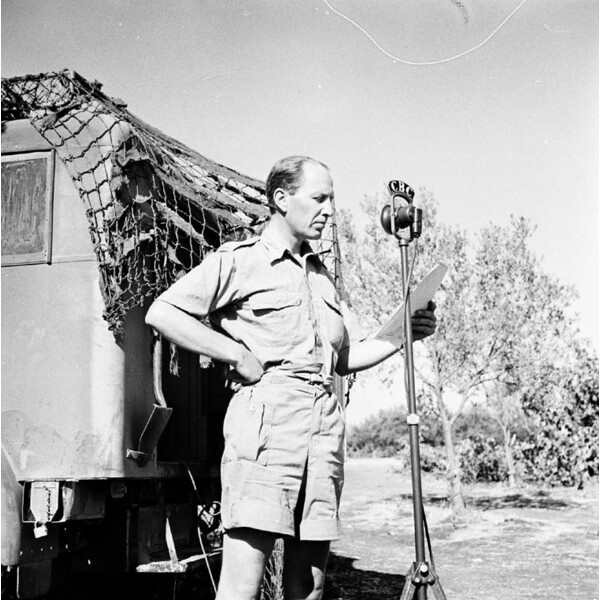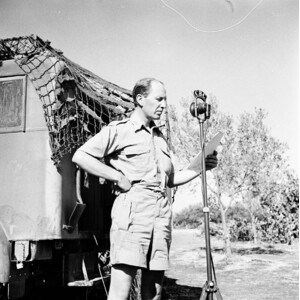Information/Write-up
Matthew Halton (1904–1956)
Matthew Halton was one of Canada’s most distinguished journalists — a pioneering foreign correspondent whose steady voice brought some of the most dramatic moments of the 20th century directly into Canadian homes. Born September 7, 1904, in the frontier town of Pincher Creek, Alberta, Halton grew up on the open prairies, the son of English immigrants who carved out a living under difficult pioneer conditions. His early years instilled in him both a quiet resilience and a curiosity about the wider world.
After teaching in rural Alberta, Halton pursued higher education at the University of Alberta, earning his BA in 1929 while editing The Gateway, the campus newspaper. His journalistic ambitions led him overseas to England, where he studied at King’s College London and the London School of Economics on an IODE scholarship. From London, he began filing dispatches for Canadian newspapers, quickly establishing a reputation as a gifted observer with a sharp eye for global affairs.
In 1931, Halton joined the Toronto Star and was soon posted to Europe as a foreign correspondent. The timing could not have been more consequential: he arrived as Adolf Hitler’s rise to power was reshaping Germany, and soon found himself reporting on the unfolding crisis across Europe. Halton's reports from the Spanish Civil War in 1936, his coverage of the 1938 Munich Crisis, and his frontline dispatches from the Russo-Finnish Winter War (1939–40) helped bring distant conflicts into sharp focus for Canadians, who were themselves on the cusp of global war.
As World War II erupted, Halton’s clear, calm reporting style was increasingly in demand. He began filing radio reports for the CBC, becoming one of Canada’s earliest and most trusted radio war correspondents. In 1941 he was transferred to cover the Middle East campaigns, where he reported from North Africa as Allied forces pushed toward El Alamein. His experiences during this period formed the basis of his 1944 book Ten Years to Alamein.
In 1943, Halton was appointed the CBC’s senior war correspondent. He followed Canadian troops through the Italian campaign, reported from the beaches of Normandy following D-Day, and covered the final push into Northwest Europe. His voice became a familiar and steady presence in Canadian households, narrating both the victories and the tragedies of war with a mix of clarity, compassion, and unflinching honesty. By some estimates, his broadcasts reached as much as 80 percent of the Canadian population during the height of the war.
For his exceptional service, Halton was appointed Officer of the Order of the British Empire (OBE) in 1945. After the war, he remained stationed in London as CBC’s European correspondent, covering some of the most important post-war events, including the Nuremberg Trials, the funeral of King George VI, the coronation of Queen Elizabeth II, the 1954 Geneva Conference, and the early years of the Cold War.
Matthew Halton’s career was cut short when he died in London on December 3, 1956, following complications from stomach surgery. He was only 52. His legacy endures not only through his groundbreaking reporting but also through his family: his son, David Halton, went on to become CBC’s chief political correspondent, carrying forward his father’s journalistic torch.
For many Canadians, Matthew Halton was the voice that carried them through the Second World War—a voice of reason and reliability during a time of global uncertainty. His pioneering work helped define Canadian international journalism in the modern era, and he remains a revered figure in the history of Canadian media.
-Robert Williston


No Comments